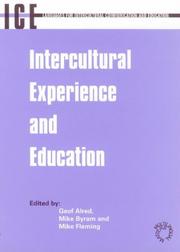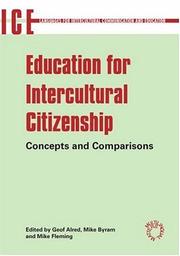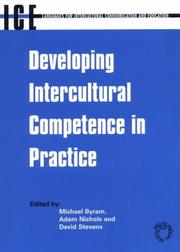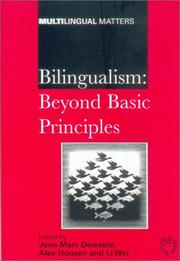| Listing 1 - 10 of 15 | << page >> |
Sort by
|
Periodical
Abstract | Keywords | Export | Availability | Bookmark
 Loading...
Loading...Choose an application
- Reference Manager
- EndNote
- RefWorks (Direct export to RefWorks)
children's literature --- English language teaching --- language education --- intercultural competence --- critical literacy --- young adult literature --- english language teaching

ISBN: 1280739274 9786610739271 1853596086 9781853596087 6610739277 1853596078 185359606X Year: 2003 Publisher: Clevedon Multilingual Matters
Abstract | Keywords | Export | Availability | Bookmark
 Loading...
Loading...Choose an application
- Reference Manager
- EndNote
- RefWorks (Direct export to RefWorks)
This edited volume explores the educational significance of intercultural experience. It offers a broader conception of interculturality than commonly found in the area of foreign language teaching. Contributors represent a diverse range of academic and professional interests. The aim of the book is to encourage dialogue and interchange across this range, and beyond, to stimulate thinking about the educational value of intercultural experience.
Book
ISBN: 9781783099559 1783099550 9781783099542 1783099542 9781783099566 9781783099573 1783099577 1783099569 Year: 2018 Publisher: Bristol Multilingual Matters
Abstract | Keywords | Export | Availability | Bookmark
 Loading...
Loading...Choose an application
- Reference Manager
- EndNote
- RefWorks (Direct export to RefWorks)
"This book presents a new and comprehensive framework for the analysis of representations of culture, society and the world in textbooks for foreign and second language learning. It points to the need for language learning materials to deal seriously with knowledge about the world, including its diversities and problems"--
Cultural pluralism in textbooks. --- Kulturkontakt. --- Language and culture. --- Language and languages --- Multicultural education. --- Pluralistische Gesellschaft. --- Sprachlehrbuch. --- Weltbild. --- Textbooks --- Evaluation. --- Sociolinguistics --- Language teaching materials. --- Textbook analysis. --- critical cultural awareness. --- culture in language learning. --- intercultural competence. --- language learning materials. --- national stereotypes.
Book
ISBN: 9783031444722 Year: 2024 Publisher: Cham : Springer International Publishing : Imprint: Palgrave Macmillan,
Abstract | Keywords | Export | Availability | Bookmark
 Loading...
Loading...Choose an application
- Reference Manager
- EndNote
- RefWorks (Direct export to RefWorks)
This Open Access book examines the link between intercultural competence (IC) and pragmatics by asking frontline modern foreign language teachers in higher education teaching a variety of languages (e.g., Dutch, English, French, German, Italian, Spanish, Swedish) how they conceptualise intercultural competence and which skills, competences and knowledge they consider important in their teaching contexts. The data were collected with an online survey that focused on the relationship between intercultural competence and pragmatics. While international organizations such as the United Nations Educational, Scientific and Cultural Organization (UNESCO) or the Council of Europe (CoE) agree that intercultural competence should play an important role in education, it is not always clear what IC may encompass in specific teaching contexts and subject areas. Examining how modern foreign language teachers in higher education conceptualise intercultural competence and the value they attach as well as the attention they give to various areas of pragmatics in their teaching is highly important, since those language professionals may be the final teachers learners encounter during their formal foreign language education. They are therefore in a unique position to shape modern foreign language learners’ intercultural and pragmatic awareness, competence and skills. This book will be of interest to language professionals, modern foreign language teachers and teacher trainers, as well as students and scholars of applied linguistics, pragmatics, and language education. Gila A. Schauer is Professor of English and Applied Linguistics at the University of Erfurt, Germany. She has been researching aspects of intercultural and pragmatic competence for more than 20 years, beginning with her MA and PhD dissertations on cross-cultural and interlanguage pragmatics, then exploring cross-cultural (im)politeness perceptions, young learners and L2 pragmatics, as well as foreign language teachers' views and conceptualisations of intercultural competence. She was Director of the EAP/Study Skills Programme at Lancaster University from 2005 to 2010 and Director of the Language Centre at the University of Erfurt from 2012 to 2014. .
Intercultural teaching --- Intercultural competence --- Intercultural education --- Pragmatics. --- Intercultural communication. --- Language and languages --- Education, Higher. --- Intercultural Communication. --- International and Intercultural communication. --- Language Teaching and Learning. --- Higher Education. --- Study and teaching.
Multi
ISBN: 9789462980594 9462980594 9789048529988 9048529980 Year: 2017 Volume: *2 Publisher: Amsterdam Amsterdam University Press
Abstract | Keywords | Export | Availability | Bookmark
 Loading...
Loading...Choose an application
- Reference Manager
- EndNote
- RefWorks (Direct export to RefWorks)
For centuries, French was the language of international commercial and diplomatic relations, a near-dominant language in literature and poetry, and was widely used in teaching. It even became the fashionable language of choice in the eighteenth and nineteenth centuries for upper class Dutch, Russians, Italians, Egyptians, and others for personal correspondence, travel journals, and memoirs. This book is the first to take a close look at how French was used in that latter context: outside of France, in personal and private life. It gathers contributions from historians, literary scholars, and linguists and covers a wide range of geographical areas.
Intiem taalgebruik --- Taal en culturele identiteit --- Discoursanalyse --- tweetaligheid --- meertaligheid --- Taal en culturele identiteit. --- Discoursanalyse. --- tweetaligheid. --- meertaligheid. --- Analyse du discours. --- Ethnicité. --- French language --- History. --- Usage. --- Sociolinguistics --- anno 1500-1599 --- anno 1600-1699 --- Europe --- Tweetaligheid. --- Meertaligheid. --- Francophonie French as second language Diglossia Bilingualism Expression of the "intimate" self Intercultural competence in Foreign Language writing Egodocuments.
Book
ISBN: 1783090375 1783090367 9781783090365 1783090359 1299831664 1783090340 Year: 2013 Volume: 25 Publisher: Bristol Blue Ridge Summit
Abstract | Keywords | Export | Availability | Bookmark
 Loading...
Loading...Choose an application
- Reference Manager
- EndNote
- RefWorks (Direct export to RefWorks)
Despite widespread agreement about the need to develop interculturally competent graduates, there is a lack of agreement about how this goal may be achieved in practice. This is significant as universities around the world, particularly in English-speaking countries, have espoused an interculturally-aware vision for their future graduates and turned to language education, as an inherently intercultural activity, to expose students to a world which is linguistically and culturally different from their own. This book focuses on narrowing the gap between the often conflicting theoretical and practical imperatives faced by language teachers in an internationalised higher education context. It does so by providing comprehensive conceptual discussions of emerging critical intercultural language pedagogies as well as empirical accounts and case studies from the frontline.
Language and languages --- Language teachers --- Language and culture --- Culture and language --- Culture --- Foreign languages --- Languages --- Anthropology --- Communication --- Ethnology --- Information theory --- Meaning (Psychology) --- Philology --- Linguistics --- Study and teaching (Higher) --- Training of. --- Study and teaching --- higher education. --- intercultural communication. --- intercultural competence. --- intercultural teaching. --- university.
Book
ISBN: 9781783098644 Year: 2017 Publisher: Bristol Blue Ridge Summit
Abstract | Keywords | Export | Availability | Bookmark
 Loading...
Loading...Choose an application
- Reference Manager
- EndNote
- RefWorks (Direct export to RefWorks)
In this book the author explores the work and living experiences of Confucius Institute Chinese teachers (CICTs) in the UK, how they interpret and make sense of their sojourning experience, and how this context and the wider globalised social environment have impacted on their understandings and their personal growth. Because of their betwixt and between situation, the CICTs’ stories differ from those of other immigrants, international students and pre-service student teachers, who have been the main focus in L2 identity research. The book offers new insights into the Confucius Institutes (CI) with real life stories from teachers drawn from blogs, interviews and focus groups, drawing attention in the process to weaknesses of the CI programme and offering suggestions for ways forward which will be of interest to both stakeholders and those responsible for future international exchange programmes.
Chinese language --- Language and culture --- Language teachers --- Learning and scholarship --- CI. --- CICT. --- Chinese. --- Confucius Institute Chinese teachers. --- Confucius Institutes. --- Identity. --- Intercultural competence. --- L2 identity research. --- Teachers. --- culture. --- soft power. --- LANGUAGE ARTS & DISCIPLINES / Linguistics / General. --- Sino-Tibetan languages --- Erudition --- Scholarship --- Civilization --- Intellectual life --- Education --- Research --- Scholars --- Teachers --- Culture --- Globalization. --- Study and teaching --- Foreign speakers. --- Cross-cultural studies.

ISBN: 1853599190 1853599182 1853599204 9781853599194 9781853599187 9781853599200 1280609672 9786610609673 Year: 2006 Volume: 13 Publisher: Clevedon [England] Buffalo, N.Y. Multilingual Matters
Abstract | Keywords | Export | Availability | Bookmark
 Loading...
Loading...Choose an application
- Reference Manager
- EndNote
- RefWorks (Direct export to RefWorks)
This book presents a vision of education for citizenship, which takes as its starting point an account of what it means to be intercultural. Theory and concepts of interculturality are applied to citizenship education in order to extend its meaning and significance within and beyond the nation state. The book advances a concept of intercultural citizenship which is sensitive to complexities of identity and diversity and, through international case studies, analyses the degree to which intercultural citizenship is present or emergent in contemporary education systems It provides a statement of ‘axioms and characteristics’ of education for intercultural citizenship to act both as a framework for planning education for intercultural citizenship and as criteria for evaluating the degree of intercultural citizenship education already present in existing education systems. The book will be of interest to those currently working in intercultural education as well as those who work in education for citizenship.
Citizenship --- Multicultural education --- Study and teaching --- #SBIB:316.334.1O340 --- #SBIB:324H60 --- Birthright citizenship --- Citizenship (International law) --- National citizenship --- Nationality (Citizenship) --- Political science --- Public law --- Allegiance --- Civics --- Domicile --- Political rights --- Onderwijs en sociale verandering, onderwijs en samenleving --- Politieke socialisatie --- Law and legislation --- Citizenship. --- Education --- Social Sciences --- Education, Special Topics --- Citizenship - Study and teaching - Cross-cultural studies. --- Multicultural education - Cross-cultural studies. --- citizenship education. --- intercultural citizenship. --- intercultural competence.

ISBN: 1853595373 1853595365 184769960X 9786610827763 1280827769 1853595357 9781853595356 9781853595370 9781853595363 9781847699602 9781280827761 6610827761 Year: 2001 Volume: 1 Publisher: Clevedon Multilingual Matters
Abstract | Keywords | Export | Availability | Bookmark
 Loading...
Loading...Choose an application
- Reference Manager
- EndNote
- RefWorks (Direct export to RefWorks)
It is now widely recognised that learning a language should not just involve linguistic competence but also intercultural competence. It is also clear that intercultural competence can be developed through related subjects such as geography, history, mother tongue teaching. This book takes this as a given and provides practical help for teachers who wish to help their learners acquire intercultural competence in the ordinary classroom. It contains descriptions of lessons and materials from a wide range of classrooms in several countries and for beginners to advanced learners.
Intercultural communication --- Multicultural education --- Language and languages --- Study and teaching --- Teaching --- Intercultural education --- Education --- Culturally relevant pedagogy --- Foreign language study --- Language and education --- Language schools --- Cross-cultural communication --- Communication --- Culture --- Cross-cultural orientation --- Cultural competence --- Multilingual communication --- Technical assistance --- Anthropological aspects --- Culturally sustaining pedagogy --- Multicultural education. --- Study and teaching. --- Language and languages Study and teaching --- Intercultural communication - Study and teaching --- Language and languages - Study and teaching --- intercultural competence. --- intercultural education. --- teaching.

ISBN: 1853596264 1853596256 9781853596261 9781853596209 1853596205 9781853596193 1853596191 1280828110 9786610828111 1853596213 1847699235 9786610828135 1280828137 1853596310 9781853596315 9781853596254 Year: 2003 Volume: 123 Publisher: Clevedon: Multilingual matters,
Abstract | Keywords | Export | Availability | Bookmark
 Loading...
Loading...Choose an application
- Reference Manager
- EndNote
- RefWorks (Direct export to RefWorks)
This book examines the influence of cultural values and communication styles on intercultural communication and demonstrates how training can develop intercultural communication competencies. A large number of interactions between well-educated immigrants from all continents and from more than a hundred countries, together with some including native speakers, are examined and participants’ answers to questionnaires compared with their actual communicative behaviour. The author raises questions of interest to many groups: linguists, educators, business people and sociologists. Which values are most salient and enduring, and which cause clashes between cultural groups? To what extent do people retain the communication style identified with their first language and how do these different styles impact on others?
Bilingualism --- Psycholinguistics --- Sociolinguistics --- Language and languages --- Languages in contact --- Multilingualism --- Discourse analysis --- Intercultural communication --- #KVHA:Discourse analysis --- #KVHA:Interculturele communicatie --- Cross-cultural communication --- Communication --- Culture --- Cross-cultural orientation --- Cultural competence --- Multilingual communication --- Technical assistance --- Discourse grammar --- Text grammar --- Semantics --- Semiotics --- Anthropological aspects --- SOCIAL SCIENCE --- Discrimination & Race Relations --- Journalism & Communications --- Communication & Mass Media --- Bilingualism. --- Language and languages. --- Foreign languages --- Languages --- Anthropology --- Ethnology --- Information theory --- Meaning (Psychology) --- Philology --- Linguistics --- Discourse Analysis. --- Intercultural Communication. --- intercultural competence.
| Listing 1 - 10 of 15 | << page >> |
Sort by
|

 Search
Search Feedback
Feedback About UniCat
About UniCat  Help
Help News
News